I walked to the door and knocked. “Just a minute,” answered a weak, elderly voice.
After a long pause, the door opened. A small woman in her eighties stood before me. By her side was a small suitcase.
I took the suitcase to the car, and then returned to help the woman. She took my arm and we walked slowly toward the car.
She kept thanking me for my kindness. “It’s nothing,” I told her. “I just try to treat my passengers the way I would want my mother treated.”
“Oh, you’re such a good man,” she said. When we got into the taxi, she gave me an address, and then asked, “Could you drive through downtown?”
“It’s not the shortest way,” I answered quickly.
“Oh, I’m in no hurry,” she said. “I’m on my way to a hospice (临终医院). I don’t have any family left. The doctor says I don’t have very long.”
I quietly reached over and shut off the meter (计价器).
For the next two hours, we drove through the city. She showed me the building where she had once worked, the neighborhood where she had lived, and the furniture shop that had once been a ballroom where she had gone dancing as a girl.
Sometimes she’d ask me to slow down in front of a particular building and would sit staring into the darkness, saying nothing.
At dawn, she suddenly said, “I’m tired. Let’s go now.”
We drove in silence to the address she had given me.
“How much do I owe you?” she asked.
“Nothing,” I said.
“You have to make a living,” she answered. “Oh, there are other passengers,” I answered.
Almost without thinking, I bent and gave her a hug. She held onto me tightly. Our hug ended with her remark, “You gave an old woman a little moment of joy.”
1. The old woman chose to ride through the city in order to ________.
| A.show she was familiar with the city |
| B.see some places for the last time |
| C.let the driver earn more money |
| D.reach the destination on time |
| A.wanted to do her a favor |
| B.shut off the meter by mistake |
| C.had received her payment in advance |
| D.was in a hurry to take other passengers |
| A.Giving is always a pleasure. |
| B.People should respect each other. |
| C.An act of kindness can bring people great joy. |
| D.People should learn to appreciate others’ concern. |
The recent success of children's books has made the general public aware that there's a huge market out there.
And there's a growing need for new writers trained to create the $3 billion worth of children's books bought each year ... plus stories and articles needed by over 650 publishers of magazines for children and teenagers.
Who are these needed writers? They're ordinary folks like you and me.
But am I good enough?
I was once where you might be now. My thoughts of writing had been pushed down by self-doubt, and I didn't know where to turn for help.
Then, I accepted a free offer from the Institute to test my writing aptitude(潜能), and it turned out to be the inspiration I needed.
The promise that paid off
The Institute made the same promise to me that they will make to you, if you show basic writing ability:
You will complete at least one manuscript(手稿) suitable to hand in to a publisher by the time you finish our course.
I really didn't expect any publication before I finished the course, but that happened. I sold three stories. And I soon discovered that was not unusual at the Institute.
Since graduation, I have authored 34 nationally published children's books and over 300 stories and articles.
Free test and brochure
We offer a free aptitude test and will send you a copy of our brochure describing our recognized home-study courses on the basis of one-on-one training.
Realize your writing dream today. There's nothing sadder than a dream delayed until it fades forever.
Sincerely,
Kristi Holl, Instructor
Institute of Children's Literature
1. From the first three paragraphs, we learn that ________.
| A.children’s books are usually bestsellers |
| B.publishers are making $3 billion each year |
| C.magazines for teenagers have drawn public attention |
| D.there is a growing need for writers of children’s books |
| A.be a successful publisher |
| B.become a confident editor |
| C.finish one work for publication |
| D.get one story or article published |
| A.prove she is a good instructor |
| B.promote the writing program |
| C.give her advice on course preparation |
| D.show she sold more stories than article |
3 . How I Turned to Be Optimistic
I began to grow up that winter night when my parents and I were returning from my aunt's house, and my mother said that we might soon be leaving for America. We were on the bus then. I was crying, and some people on the bus were turning around to look at me. I remember that I could not bear the thought of never hearing again the radio program for school children to which I listened every morning.I do not remember myself crying for this reason again. In fact, I think I cried very little when I was saying goodbye to my friends and relatives. When we were leaving I thought about all the places I was going to see—the strange and magical places I had known only from books and pictures. The country I was leaving never to come back was hardly in my head then.
The four years that followed taught me the importance of optimism, but the idea did not come to me at once. For the first two years in New York I was really lost—having to study in three schools as a result of family moves. I did not quite know what I was or what I should be. Mother remarried, and things became even more complex for me. Some time passed before my stepfather and I got used to each other. I was often sad, and saw no end to “the hard times. ”
My responsibilities in the family increased a lot since I knew English better than everyone else at home. I wrote letters, filled out forms, translated at interviews with Immigration officers, took my grandparents to the doctor and translated there, and even discussed telephone bills with company representatives.
From my experiences I have learned one important rule: Almost all common troubles eventually go away! Something good is certain to happen in the end when you do not give up, and just wait a little! I believe that my life will turn out all right, even though it will not be that easy.
1. How did the author get to know America?
| A.From her relatives. | B.From her mother. |
| C.From Books and pictures. | D.From radio programs. |
| A.confused | B.excited |
| C.worried | D.amazed |
| A.often lost her way |
| B.did not think about her future |
| C.studied in three different schools |
| D.got on well with her stepfather |
| A.She worked as a translator. |
| B.She attended a lot of job interviews. |
| C.She paid telephone bills for her family. |
| D.She helped her family with her English. |
| A.her future will be free from troubles |
| B.it is difficult to learn to become patient |
| C.there are more good things than bad things |
| D.good things will happen if one keeps trying |
The Pillow
At the age of sixteen, I joined a volunteer group with my dad. I went on my first volunteer project in West Virginia. On the night we arrived, we discovered that “our family” was living in a trailer(拖车) that was in poor condition. A crew had been working on it for two weeks, but every time they finished one problem, another surfaced.
We decided the only reasonable solution was to build a new house — something unusual but necessary under these circumstances. The family was overjoyed with their new house that was twenty by thirty feet with three bedrooms, a bath and a kitchen.
On Tuesday of that week, while we ate lunch together, I asked the family’s three boys, Josh, Eric and Ryan, “What do you want for your new room?” Expecting toys and other gadgets that children usually ask for, we were surprised when Josh responded, “I just want a bed.”
The boys had never slept in a bed! They were accustomed to plastic mats. That night we had a meeting and decided that beds would be the perfect gift. On Thursday night, a few adults in our group drove to the nearest city and bought beds and new bedding.
When we saw the delivery truck coming, we told the family about the surprise. We could hardly contain ourselves. It was like watching excited children on Christmas morning.
That afternoon, as we fitted the frames of the beds together, Eric ran into the house to watch us. Too dirty to enter his room, he observed with wide-eyed enthusiasm from the doorway.
As my father slipped a pillowcase onto one of the pillows, Eric asked, “What is that?”
“A pillow,” he replied.
“What do you do with it?” Eric continued to ask.
“When you go to sleep, you put your head on it,” I answered softly. Tears came to our eyes as she handed Eric the pillow.
“Oh . . . that’s soft,” he said, hugging it tightly.
Now, when my sister or I start to ask for something that seems urgent, my Dad gently asks, “Do you have a pillow?”
We know exactly what he means.
1. The writer’s first volunteer project was ________.| A.working on a poor trailer | B.helping a poor family |
| C.donating beds and bedding | D.dealing with a housing problem |
| A.the family lived in a trailer | B.he expected to get some toys |
| C.he didn’t know what a bed was | D.the boys had no bed to sleep in |
| A.a trailer | B.a truck | C.a pillow | D.a house |
| A.what they want to get may be unnecessary |
| B.they should not waste money on small things |
| C.they should do more volunteer work for the poor |
| D.what he will buy is not what they want but a pillow |
How could people enter the house? At the very moment, a man carrying a ladder rushed to the flames and got into the window. When he appeared again in the eyes of the people, the little girl was in his arms. He gave the child to the crowd, and then disappeared into the night.
This little girl had no family. Two months later a meeting was held to find a person to adopt(收养) the girl. A teacher was willing to adopt this child, and said she could give her the best education; a farmer wanted to adopt this child, saying that village life would let the child grow up healthily and happily; a rich man said, “I can give the child everything that others can do.”
A lot of people who wanted to adopt this child said about many benefits of their adopting the child. But the little girl’s face had no expression. At this time, a man, through the crowd, walked straight in front of the little girl, and opened his arms for the little girl. People were puzzled, and they found that the man had terrible scars on his arms. The little girl let out a cry, “This is the man who saved me!” She suddenly jumped up, and buried her face in his arms and sobbed. Naturally the man adopted the girl.
1. Which of the following statements is TRUE?| A.The grandma was too old to rush out of the room. |
| B.The little girl and her grandpa lived on the second floor. |
| C.To rescue the little girl, her grandma died in the fire. |
| D.The grandma and the little girl cried for help loudly on the first floor. |
| A.He returned to his work. |
| B.He left the girl to the crowd and left quickly. |
| C.He was injured and went to the hospital. |
| D.He took the girl home. |
| A.decide who would adopt the girl |
| B.find out who had rescued the girl |
| C.decide how the girl would be raised |
| D.honor the hero who had saved the girl |
| A.People didn’t want to help the little girl at first. |
| B.The man who had saved the girl was a fireman. |
| C.The rich man would buy everything the girl needed. |
| D.The girl recognized the man and was happy to be adopted by him. |
| A.That kept cities very small. |
| B.The rest live in small towns. |
| C.The effects of urban living on people should be considered. |
| D.Soon many other industrial nations became urban societies. |
| E.But even 200 years ago, only a few people could live in cities. |
| F.Modernization drew people to the cities and made farmers more productive. |
| G.Modern cities have destroyed social relations and the health of human beings. |
Among all the fast growing science and technology, the research of human genes, or biological engineering as people call it, is drawing more and more attention now. Sometimes it is a hot topic discussed by people.
The greatest thing that gene technology can do is to cure serious diseases that doctors at present can almost do nothing with, such as cancer and heart disease. Every year, millions of people are murdered by these two killers. And to date, doctors have not found an effective way to cure them. But if the gene technology is applied, not only these two diseases can be cured completely, bringing happiness and more living days to the patients, but also the great amount of money people spend on curing their diseases can be saved, therefore it benefits the economy as well. In addition, human life span(寿命) can be prolonged.
Gene technology can help people to give birth to more healthy and clever children. Some families, with the English imperial(皇室) family being a good example, have hereditary(遗传的) diseases. This means their children will for sure have the family disease, which is a great trouble for these families. In the past, doctors could do nothing about hereditary diseases. But gene technology can solve this problem perfectly. The scientist just need to find the wrong gene and correct it and a healthy child will be born.
Some people are worrying that the gene research can be used to manufacture human beings in large quantities. In the past few years, scientists have succeeded in cloning a sheep; therefore these people predict that human babies would soon be cloned. But I believe cloned babies will not come out in large quantities, for most couples in the world can have babies in very normal way. Of course, the governments must take care to control gene technology.
1. What does "these two killers" in the second paragraph refer to?
| A.Gene technology and another treatment of the two diseases. |
| B.The two murderers who killed the cloned baby |
| C.The two diseases of cancer and heart disease |
| D.Hereditary diseases and cancer |
| A.How gene technology can be applied in the field of treating hereditary diseases. |
| B.Gene technology can be used to clone human babies. |
| C.Gene technology can help people to give birth of a baby. |
| D.Gene technology can help the English imperial family out |
| A.Using gene technology, people with hereditary diseases can have more living days. |
| B.Using gene technology, scientist finds the wrong gene and corrects it. |
| C.Using gene technology, human babies can be cloned. |
| D.Doctors can cure cancer and heart disease with the help of gene technology. |
| A.Expressing the writer’s idea that gene technology will benefit people |
| B.Telling people the advantages of gene technology |
| C.Telling the readers that gene technology will not benefit people |
| D.Explaining that gene technology will also do harm to the humanity |
Any attempt to study the development from the noises babies make to their first spoken words leads to considerable difficulties. It is agreed that they enjoy making noises, and that during the first few months one or two noises sort themselves as particularly expressive as delight, pain, friendliness, and so on. But since these can’t be said to show the baby’s intention to communicate, they can hardly be regarded as early forms of language. It is agreed, too, that from about three months they play with sounds for enjoyment, and that by six months they are able to add new words to their store. This self-imitation(模仿)leads on to deliberate(有意的)imitation of sounds made or words spoken to them by other people. The problem then arises as to the point at which one can say that these imitations can be considered as speech.
It is a problem we need to get out teeth into. The meaning of a word depends on what a particular person means by it in a particular situation and it is clear that what a child means by a word will change as he gains more experience of the world .Thus the use at seven months of “mama” as a greeting for his mother cannot be dismissed as a meaningless sound simply because he also uses it at other times for his father, his dog, or anything else he likes. Playful and meaningless imitation of what other people say continues after the child has begun to speak for himself, I doubt, however whether anything is gained when parents take advantage of this ability in an attempt to teach new sounds.
1. Before children start speaking________________.
| A.they need equal amount of listening |
| B.they need different amounts of listening |
| C.they are all eager to cooperate with the adults by obeying spoken instructions |
| D.they can’t understand and obey the adult’s oral instructions |
| A.may have problems with their listening |
| B.probably do not hear enough language spoken around them |
| C.usually pay close attention to what they hear |
| D.often take a long time in learning to listen properly |
| A.an expression of his moods and feelings |
| B.an early form of language |
| C.a sign that he means to tell you something |
| D.an imitation of the speech of adults |
as speech________________.
| A.is important because words have different meanings for different people |
| B.is not especially important because the changeover takes place gradually |
| C.is one that should be properly understood because the meaning of words changes with age |
| D.is one that should be completely ignored(忽略)because children’s use of words is often meaningless |
| A.parents can never hope to teach their children new sounds |
| B.children no longer imitate people after they begin to speak |
| C.children who are good at imitating learn new words more quickly |
| D.even after they have learnt to speak, children still enjoy imitating |
"Where did it come from?" I asked.
"I asked the Gates boy to cut it," my mother said. "I wouldn't have had one just for myself, but when in great need... such a rush! He just brought it in this afternoon."
The pine reached to the proper height, almost to the ceiling, and the Tree Top Crystal(水晶) Star was in its place. A few green branches reached out a little awkwardly(难看) at the side, I thought, and there was a bit of bare trunk showing in the middle. But the tree filled the room with warm light and the whole house with the pleasant smell of Christmas.
"It's not like the one you used to find," my mother went on. "Yours were always in good shape. I suppose the Gates boy didn't know where to look for a better one. But I couldn't be fussy(挑剔的)."
"Don't worry," I told her. "It's perfect."
It wasn't, of course, but at the moment I realized something for the first time: All Christmas trees are perfect.
1. What did his mother's Christmas tree look like?
A.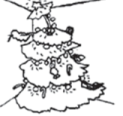 | B. | C.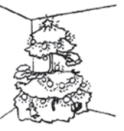 | D.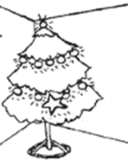 |
| A.all the soldiers had the three-day holiday |
| B.the writer could not go home for Christmas |
| C.the writer spent his first Christmas during the war |
| D.not all the soldiers went home for Christmas during the war |
| A.his mother didn't like Christmas trees |
| B.the writer didn't like the tree cut by someone else |
| C.the writer used to cut very beautiful Christmas trees |
| D.his mother didn't want to have a Christmas tree during wartime |
| A.The Perfect Christmas Tree |
| B.How to Choose a Christmas Tree |
| C.How Soldiers Spent Their Christmas |
| D.A Christmas with an Ugly Christmas Tree |
| A.Nothing is as perfect as Christmas. |
| B.Once at home, everything is so nice. |
| C.During the war, trees are hard to find. |
| D.All Christmas trees are the most beautiful. |
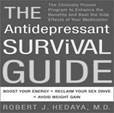
The Antidepressant Survival Guide: Beat the Side Effects of Your Medication
by Robert J. Hedaya, M.D,
Robert J. Hedaya, M.D., is a clinical professor of psychiatry at Georgetown University Hospital's Department of Psychiatry.
Motto: Live well.
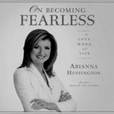
On Becoming Fearless... in Love, Work, and Life
by Arianna Huffington
Arianna Huffington was raised in Greece by her fearless mother. She has written this book for her two daughters in the hope that they will lead fearless lives.
Motto: Overcome the obstacle, get over the next hill.
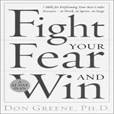
Fight Your Fear and Win
by Don Greene, Ph.D.
Don Greene, Ph.D., was a nationally ranked high school diver. He was the sports psychologist for the U.S. Olympic Diving Team.
Motto: Determination is drive.
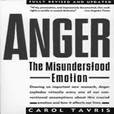
Anger: The Misunderstood Emotion
by Carol Tavris, Ph.D.
Carol Tavris, Ph.D., was senior editor. She now teaches from time to time in the department of psychology at UCLA
Motto: Reduce Stress!

The Gift of Fear
by Gavin de Becker
Davin de Becker, America’s leading expert on violence, is the bestselling author of the Gift of Fear: Survival Signals.
Motto: Trust and act on our straight instincts.
63.This useful, popular book shows that if you are gone broke and lose love, please hold yourself back. If you look fat, just face it calmly. If you are in survival thinking, the most important is that you get rid of all the difficulties in front of us, life will be safe, perfect. If your daughters are to take their rightful place in society, they must become fearless.
64.In this book, the author calls the nation’s leading experts on violent behavior, and shows you how to spot even tiny signs of danger before it’s too late. Most violent acts are unpredictable. It points out that true fear is often a signal that can save your life. Believe the threat of violence surrounds us every day. But we can protect ourselves by straight judgment.
65.This book based on his years of clinical experience. It says about twenty-five million Americans take medicine to avoid depression. Despite the advances in the treatment of depression in recent years, many patients, even with the best medical care, feel that they are not living rich and fulfilling lives. This book will direct you how to survive well.
66.This interesting book tells us that annoyance is as much a political matter as a biological one. And anger is a definite message: Pay attention to me. I don’t like what you are doing. Restore my pride. You’re in my way. Give me justice. This book suggests that when you’re angry, just let it right out.
| A.Foreword |
| B.How Fear Limits Us |
| C.Determination: How to Set Goals and Go After Them |
| D.The Anger Business |
| E.In the Presence of Danger |



